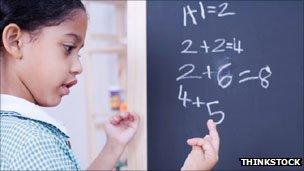Calculators in schools: Pupils face limits
- Published

Children learn basic sums early in primary school
Ministers are planning to limit the use of calculators in primary schools to stop children becoming dependent on them.
Schools Minister Nick Gibb announced a review of their use, saying children should not "reach for a gadget every time they need to do a simple sum".
Instead, he said, children should master arithmetic using written methods.
Top-performing primaries only introduce calculators in the final years.
Times tables
Mr Gibb said: "You can't expect children to cope with complicated quadratic equations if they don't know their times tables by heart.
"Without a solid grounding in arithmetic and early maths in primary school, children go on to struggle with basic maths skills throughout their school careers.
"It also means they leave school without the knowledge they need to complete everyday tasks in their adult lives. The use of calculators in primary schools must be appropriate."
The Department for Education points to the fact that one in five 11-year-olds failed to reach the level expected of them in maths this year.
It added that there was a growing demand for people with high-level maths skills in the British economy.
Mr Gibb said his department had been looking at how arithmetic was taught in schools.
He said there was a consensus that pupils needed to be able to have quick recall of number facts - such as their multiplication tables.